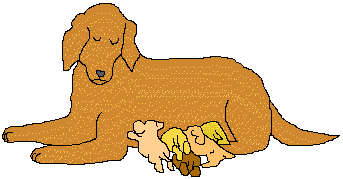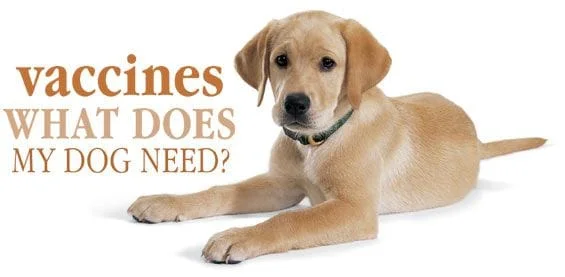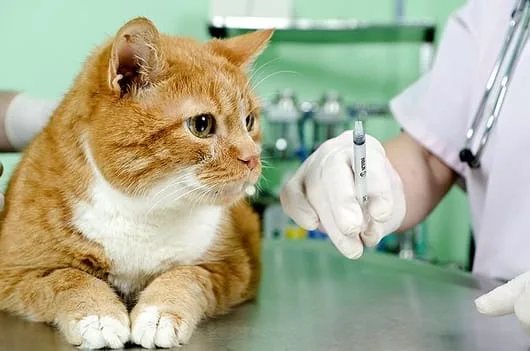Why do Baby Animals Need a Series of Shots and how many do they Need?

When a baby kitten or puppy is born, its immune system is not yet mature; the baby is wide open for infection. Fortunately, nature has a system of protection. The mother produces a certain kind of milk in the first few days after giving birth. This milk is called colostrum and is rich in all the antibodies that the mother has to offer. As the babies drink this milk, they will be taking in their mother's immunity. After the first couple of days, regular milk is produced and the baby's intestines undergo what is called closure, which means they are no longer able to take externally produced antibodies into their systems. These first two days are critical to determining what kind of immunity the baby will receive until its own system can take over.
How long this maternal antibody lasts in a given puppy or kitten is totally individual. It can depend on the birth order of the babies, how well they nursed, and a number of other factors. Maternal antibodies against different diseases wear off after different times. We DO know that by 14-20 weeks of age, maternal antibodies are gone and the baby must be able continue on its own immune system.
While maternal immunity is in the puppy’s system, any vaccines given will be inactivated. Vaccines will not be able to "take" until maternal antibody has sufficiently dropped. Puppies and kittens receive a series of vaccines ending at a time when we know the baby's own immune system should be able to respond. We could simply wait until the baby is old enough to definitely respond, as we do with the rabies vaccination, but this could leave a large window of vulnerability if the maternal antibody wanes early. To give babies the best chance of responding to vaccination, we vaccinate intermittently (usually every 2-4 weeks) during this period, in hope of gaining some early protection.
When a vaccine against a specific disease is started for the first time, even in an adult animal, it is best to give at least two vaccinations. This is because the second vaccination will produce a much greater (logarithmically greater) response if it is following a vaccine given 2-4 weeks prior.
As a guideline, puppies and kittens should be vaccinated at 8 weeks of age and boosters will be given every 3-4 weeks until they become 16 weeks of age. Booster injections should be given 12 months after the last set and annually thereafter.
What Vaccines Should I Get For My Pet?
Dog Vaccines:
- Leptospirosis: a bacteria based disease spread by infected water. It can cause fever, lethargy, vomiting, bloody diarrhea and jaundice. It can be treated by antibiotics but the bacteria can be harbored for months and their urine is a health hazard to humans and other dogs. Leptospirosis can be fatal in humans.

- Canine distemper virus: a virus spread by bodily fluids. There is no treatment and is generally fatal. Those who survive will have neurologic difficulties later in life.
- Canine parvovirus: spread by contact with infected feces. It mainly infects puppies but can be seen in older unvaccinated dogs. Symptoms include vomiting and diarrhea. Without supportive treatment, 80% of dogs infected will die.
- Infection canine hepatitis: Infection is from contact with infected bodily fluids. The virus can survive in the environment for prolonged periods. There are two types of virus: a kennel cough type and a liver infection.
- Kennel Cough: this is a combination of parainfluenza and bordetella bronchiseptica. It causes a severe upper respiratory infection. It is found in places with a high turnover of dogs like dog parks, groomers, day care and kennels.
- Rabies: contrary to what some believe, rabies is present in California and all dogs should be vaccinated against this virus. It is uniformly fatal.
Cat Vaccines:
- Feline calicivirus: commonly known as the cat fly, it's symptoms include sneezing, fever, discharge from the nose and eyes, and mouth ulcers. It is spread through cat to cat contact, airborne contact, and contamination of the living environment.

- Feline herpes virus: spread by the saliva or discharge from the nose and eyes of infected cats. It can also survive in the environment. It's symptoms are similar to the "cat flu" including fever, sneezing, conjunctivitis, and eye discharge. Once infected, cats will harbor the infection for life and can have flare ups which are symptomatically treated.
- Feline infectious peritonitis: spread by infected feces or urine. The virus attacks their immune system leaving the animal unable to fight infection. Pregnant cats can transmit the disease to their kittens. Symptoms include fever, seizures, vomiting, diarrhea and dehydration.
- Feline leukemia virus: this is spread via close contact with an infected cat. Multi cat households are more at risk as are indoor/outdoor animals. Symptoms include poor body condition, anorexia, diarrhea and jaundice. The virus attacks the bone marrow which causes leukemia.
- Rabies: any cat that goes outside or travels should be vaccinated for rabies.
Please call us today to schedule an appointment to get your pets vaccinated.